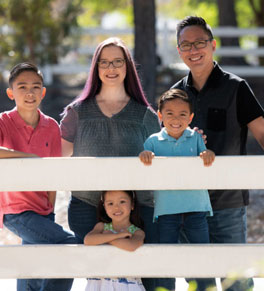Pancreatic cancer discovered during pregnancy

Five-year-old Emlee jumps high, runs fast and likes to pirouette around the living room in her ballet slippers.
Her mom, Karalayne Maglinte, calls her a miracle. Indeed, Emlee is one of the reasons Maglinte is alive today.
Another reason: High-risk pregnancy physicians and cancer specialists at UCI Health were able to help the Fontana woman when no one else could.
Cancer during pregnancy is a rare event, occurring approximately once per 1,000 pregnancies annually, according to the National Institutes of Health’s World Journal of Oncology.
Itchiness signals a problem
Karalayne and Emlee Maglinte’s story began to unfold in 2013 when Maglinte was 15 weeks pregnant. She was 36 years old and had two boys at home: Ian, 6, and Isaac, 18 months.
“Because I was pregnant, I was much more aware of my body’s cues that something wasn’t right, and I was quicker to react than I might have been otherwise,” Maglinte says.
“My hands and feet were itchy — so itchy I wanted to tear them off.” She consulted “Dr. Google” and read her symptoms suggested it could be a liver issue.
“At first I thought perhaps it was because I was pregnant with a girl, and the other two were boys,” Maglinte recalls. “But it got so intense that I began to worry. I didn’t want to endanger her.”
The itchiness began on a Friday. By Monday, she was convinced that she needed to call her doctor.
Symptoms of cancer worsen
An arduous round of tests, physician appointments and hospitalizations ensued as several Inland Empire doctors tried unsuccessfully to diagnose and treat Maglinte.
In addition to the itchiness, she developed jaundice. After four days at a community hospital, she was taken by ambulance in the middle of the night to UCI Medical Center in Orange.
A team quickly assembled, including high-risk maternal-fetal expert Dr. Julianne Toohey, gastrointestinal endoscopy specialist Dr. John Lee, and pancreatic cancer surgeons led by Dr. David Imagawa.
They were able to provide the kind of specialized diagnosis and care available only at an academic medical center and Orange County’s only National Cancer Institute-designated comprehensive cancer center.
Early diagnosis of aggressive pancreatic cancer
Lee – an authority in diseases of the liver, pancreas, bile ducts and gallbladder – examined Maglinte using endoscopic ultrasound. His findings led to a biopsy of her pancreas.
He also implanted a bile duct stent to alleviate her jaundice. Although complex, each procedure was minimally invasive and safe for the baby.
But the diagnosis was daunting: Maglinte had an early but aggressive form of pancreatic cancer. “It’s strange that she would have had cancer at that age,” Lee notes.
Statistically, almost all pancreatic cancer patients are older than age 45, with the average at the time of diagnosis being 70. Maglinte was only about half that.
She was devastated. “I kept walking around the halls of the maternity ward saying: ‘How the heck did I get here? This is crazy.’”
Two lives at stake
There weren’t many options. Early delivery “meant the baby would not have survived, as I was only 19 weeks pregnant,” Maglinte explains.
But she also had two children at home to consider. She and her husband, Dennis, discussed it.
“He said it was my choice,” Maglinte relates. “I wanted to fight for her, but I also needed to fight for myself.”
The decision made, the UCI doctors worked tirelessly to save both mother and child.
“Taking care of a high-risk patient with cancer involves careful communication with the whole team and, of course, the patient,” Toohey says. “Karalayne was very involved in decision-making.”
Risky Whipple procedure
Eleven days after the biopsy and diagnosis, Maglinte underwent a lengthy Whipple procedure, or pancreaticoduodenectomy, to remove the part of the pancreas where the tumor was growing. The surgeons also removed several other structures interwoven with the pancreas.
Maglinte went home a week after the surgery. But she didn’t require chemotherapy, which would have jeopardized Emlee’s survival.
“We watched the baby’s growth and ended up with a planned delivery at 39 weeks,” Toohey recalls. “This is rather unusual with cancer patients – we usually deliver several weeks earlier in order for chemo or other treatment to begin as soon as possible.”
Happily, 7-pound, 1-ounce Emlee was born without complications.
'A little lifesaver'
Her mom calls her “a little lifesaver” because only 20% of pancreatic cancers are diagnosed early, mainly because symptoms – abdominal or mid-back pain, jaundice, weight loss and indigestion – can overlap with those of other conditions.
“Without Emlee, I probably wouldn’t have reacted to my symptoms the way I did,” Maglinte says.
Today, she remains free of cancer but requires periodic exams to check for a recurrence of the disease. “It’s nothing short of miraculous,” Lee says.
As for Maglinte, “I don’t know what I would have done without UCI. We were at the right place at the right time with the right teams. Everything just fell into line. Everyone we needed to be there was there.”




